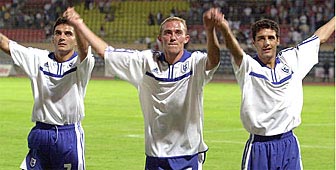Transfer system not yet dead, says UEFA

European football's governing body, UEFA, says that talk of the game's transfer system being scrapped may be a little premature. The Swiss player who provoked the crisis has told swissinfo he wants any new system to protect smaller clubs.
Last week, the world governing body, FIFA, appeared to have caved in to demands from the European Commission that transfer fees be scrapped because they infringe EU rules on the free movement of labour.
The announcement by FIFA’s Swiss president, Sepp Blatter, was greeted with predictions of chaos. An end to the transfer system would lead to many small clubs being forced out of business, give top players the right to rip up their contracts and demand ever-higher wages, it was suggested.
Now UEFA, which accused Blatter of throwing in the towel too quickly, is fighting back.
“European football has not been properly consulted. We are now working with the European leagues and players’ groups to make sure our voice is heard,” says UEFA spokesman, Mike Lee.
“It’s not appropriate to talk of the end of the transfer system. There’s still a lot of talking to be done,” he told swissinfo.
Now after meeting FIFA in Zurich, UEFA, has announced the creation of a Transfer Task Force, involving senior officials from FIFA and UEFA and representatives of national leagues and players’ organisations.
It will be headed by Per Omdal, Vice-President of UEFA and a member of FIFA’s Executive Committee, and includes FIFA Secretary General Michel Zen-Ruffinen and Gerhard Aigner, UEFA’s Chief Executive Officer.
“It is essential that football does some creative thinking so we can agree a package of proposals that meets the concerns of the European Commission while also protecting the well-being of the game,” Omdal said in a statement.
“Change is needed, change will come. But it must be done through genuine dialogue and in a way that recognises the special features of competitive sport,” he added.
UEFA stresses that any future agreement must protect the development of young players, maintain an element of contract stability, and introduce a compensation system for the small clubs which nurture young talent.
The changes were unwittingly brought about by the Swiss international, Massimo Lombardo, a 27-year-old midfielder with dual Swiss and Italian nationality, currently playing for Lausanne.
When he moved from Grasshoppers Zurich to Perugia three years ago, the Italian club refused to pay a transfer fee because they considered him an EU national. A European Commission inquiry backed Perugia’s position.
Lombardo has been likened to Jean-Marc Bosman, the Belgian player whose case allowed out-of-contract players to change clubs without a transfer fee.
“I never thought back then that it would lead to these changes,” Lombardo told swissinfo.
“Now they are calling me Bosman II. I’m a footballer, and I just want to play football. But if my case helps to improve things then I’ll be happy,” he says.
However, Lombardo is clear that a great deal of negotiating is needed so that certain safeguards can be put in place.
“There are a lot of small clubs which work better with younger players than the big clubs. I really hope that this won’t cause problems for these small clubs,” he says.
“But it’s up to the European Union and FIFA to find a good solution. They mustn’t penalise the small clubs which don’t have the financial means of the bigger clubs.”
Unlike Bosman, Lombardo is still able to make his living on the football field. But like Bosman, he has been made aware of one eternal truth about football :
“My experience has shown me that in football, just as in life, it’s money that influences the big decisions,” he says.
By Roy Probert

In compliance with the JTI standards
More: SWI swissinfo.ch certified by the Journalism Trust Initiative
You can find an overview of ongoing debates with our journalists here. Please join us!
If you want to start a conversation about a topic raised in this article or want to report factual errors, email us at english@swissinfo.ch.